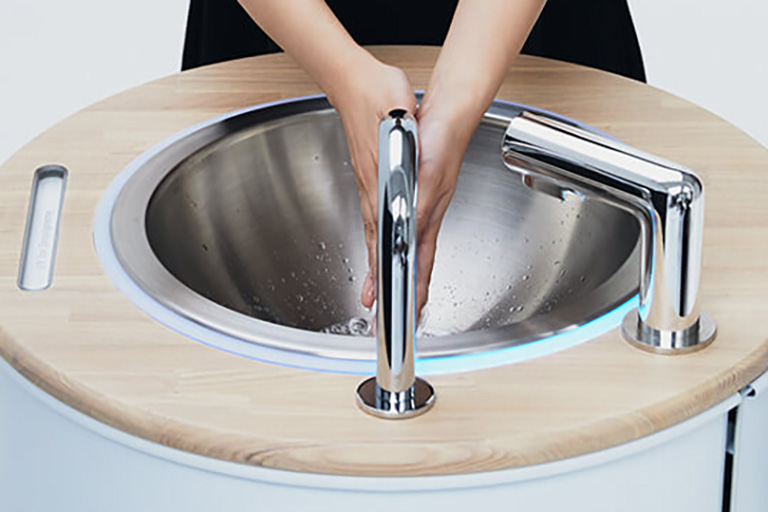A stainless-steel built wash station offers portable sanitisation with a high-tech, decentralised water recycling and quality system that is being deployed across the city of Tokyo.
With population growth and climate change expected to result in the decreasing availability of fresh water, the sustainability of water delivery systems is increasingly under scrutiny.
Against the added backdrop of a global pandemic that has put public hygiene front of mind, a University of Tokyo affiliated start-up called WOTA has created a portable water treatment system that encourages the use of water in a more sustainable manner.
WOSH units are portable hand washing stations encased in steel drums, allowing them to be easily transported and installed, even in cases of emergency. They can be set up anywhere there is an available power source while no water supply, drainage system or construction is required.
It just needs to be filled up and plugged in before it’s ready for operation as the water is near-completely reused within the system, meaning 98% of the water needed for each wash is no longer wasted. As such, just 20 litres of water are enough for more than 500 uses.
Ingenious hygiene
The water is kept sanitary by a mix of traditional filter and chlorine purification and innovative antibacterial UV light treatment that maintains World Health Organization drinking water quality guidelines, though WOTA does not recommend that the water is consumed.
This water quality is monitored by a batch of sensors inside each unit that feed into an AI-controlled quality assurance system that ensures safe use.
Each unit even has a slot where users can place their mobile phones for quick UV decontamination. As mobile phones are prime vectors for bacteria, this prevents users from re-contaminating their hands immediately after washing.
Stainless steel pipes also aid in maintaining water quality, as the material’s non-porous and corrosion-resistant properties allow it to be sanitised repeatedly with no loss in performance.
 WOSH’s innovative sanitation methods ensures that just 20 litres of water are enough for more than 500 uses
WOSH’s innovative sanitation methods ensures that just 20 litres of water are enough for more than 500 uses
Decentralising water supply
WOSH units have already been installed at more than 200 locations across Tokyo, in sites as diverse as restaurants, hospitals, and stadiums. WOTA believes that decentralising water supply in this way can support security and resilience in large cities.
“Japan runs on large-scale, centralised water supply and sewage systems,” says Yosuke Maeda, CEO of WOTA. “In the event of an urban disaster, such as a major earthquake hitting the Tokyo area or localised torrential rain, a system failure in any one location may paralyse the entire system.
“On the other hand, an autonomous, decentralised water infrastructure allows the components of the system to be managed individually across many different small units. This ensures that residents can have the same level of access to water in normal times and during emergencies.”
WOTA has already deployed its technology during disaster response in the wake of 2016’s Kumamoto Earthquake, 2018’s torrential rain in western Japan and floods in Yatsushiro, Kumamoto Prefecture, in 2020.
The technology can be used for more than just hand washing and has supplied clean showers to over 20,000 people at evacuation shelters with its WOTA Box system. These water recycling shower units allow for 100 litres of water, typically enough for two adults, to be used by more than 100 people.
As the world looks to increase the sustainability of its water supply, innovative steel-built solutions might just have some of the answers.
Images: WOTA